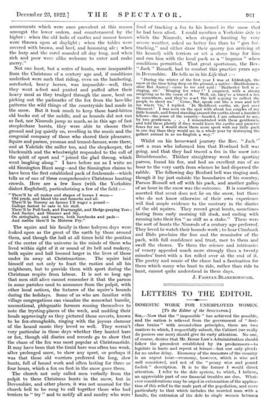LETTERS TO THE EDITOR
DOMESTIC WORK FOR UNEMPLOYED WOMEN. [To the Editor of the SPECTATOR.] SIR,—Now that the " impossible " has achieved the possible, and the nation is relieved from the government of " first- class brains " with second-class principles, there arc two matters to which, I respectfully submit, the Cabinet (we really do possess one now) should give its early attention. No one of course, desires that Mr. Bonar Law's Administration should follow the precedent established by its predecessors—to legislate in haste and repent at leisure—but one only pleadi for no undue delay. Economy of the resources of the country is an urgent issue—economy, however, which is wise and well considered, and not of the " penny wise and pound foolish " description. It is to the former I would direct attention. I refer to the dole system, to which, I believe, an appreciable part of our financial troubles are due. What- ever considerations may be urged in extenuation of the applica- tion of this relief to the male part of the population, and more particularly to that which includes the married man with a family, the extension of the dole to single women between
the ages of eighteen and forty-five should be promptly extinguished.
The avowed object of the dole is to afford means of sub- sistence for those who are thrown out of work from no fault of their own and who cannot obtain employment. This cardinal test is absolutely absent from that section of the labour market in which women have by nature and tradition a virtual monopoly. I refer to domestic service. Here there are thousands of situations waiting to be filled, and yet no servants are to be had 1 One of the Ministers of the late Government was, if my memory serves me right, heckled on this point, and in reply denied that many women capable of domestic service were drawing doles. Yet registry agents seem to agree that it is because the women and girls do draw out-of-work allowances that they get so few names upon their books. Anyway, this conflict of opinion should be definitely and authoritatively settled by a statement of the facts. It is a scandalous abuse of eleemosynary benefits that, in the presence of an admitted great shortage of female labour in the domain in which it is habitually exercised, a single woman, not disqualified by physical disability, should draw upon the fund. When women and girls of the middle classes are not ashamed of filling these positions—daughters of professional men and of clergymen (I know of two myself)—why should other women and girls of a less educated class stand idle at the cost of the nation ?
The second point is closely allied to the foregoing. It is one which, I confess, had never occurred to me until I over- heard a conversation between some workmen. It appeared from this that one of them had to share a small bedroom with two other men because of the lack of accommodation. He remarked bitterly that in the house was another bedroom occupied by two girls in daily service, adding that his landlady had told him that both girls could have bedrooms in the respective houses in which they were employed only they preferred to live out. Another man said that the former speaker's position was no worse than his, as he and his wife and two kids had all to live and sleep in one room, and for the same reason. He went on to say that when people could have bedrooms elsewhere and others couldn't, " they (the former) should be made to," for " they don't do themselves no good nor no one else, a parcel of unmarried girls a-trapesing the streets at all hours of the night!" I asked these men if the practice of maids sleeping out was general, and was assured that it is, and that there are hundreds of these girls taking houseroom from married and unmarried men who were thus compelled to herd together " against all decency." They all agreed it " ought to be stopped by law." Certainly if the case is as it was represented to me, it appears on the face of it that if landlords are restricted from the full use and profit of their property, and shortage of house accommodation is given as the reason, that girls and women who can get a bed- room where they are employed should be compelled to occupy It for the sake of the welfare of other people if not for their own.—I am, Sir, &c.,











































 Previous page
Previous page